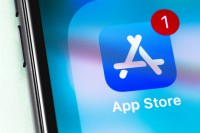Musk Heralds New Car at Tesla Battery Day

Tesla’s Battery Day event this week concluded with CEO Elon Musk heralding a new moderately priced elected car with full autonomous driving capabilities.
“Musk promised a $25,000 Tesla electric car that would be available in about three years,” writes Peter Valdes-Dapena of CNN. “That would be much cheaper than any car Tesla has made so far. Musk has a history of sometimes under-delivering on promises, or even not delivering at all. Years ago, Tesla promised a $35,000 electric car, the Tesla Model 3, but even then the Model 3 was only available at that price for a short time. Musk also promised on Tuesday that the $25,000 car would be capable of driving fully autonomously, a difficult feat because the sensors and other equipment needed for even partly autonomous driving are expensive.”
The event also shed light on Tesla’s plans for introducing advanced batteries that might lead to dramatic shifts in energy consumption, citing “improvements the company has made in its battery design and battery manufacturing capabilities. These advancements could lead to massive reductions in battery costs per kilowatt hour, a measure of a battery’s energy-holding capabilities,” according to the CNN report.

Apple May Face Stiffer Opposition to App Store Practices
Apple may be facing stronger legal challenges aimed at disrupting its highly successful App Store business model.
“A group of Apple’s critics — including Spotify Technology, Match Group and “Fortnite” creator Epic Games — have joined a nonprofit group that plans to advocate for legal and regulatory action to challenge the iPhone maker’s App Store practices,” according to a Reuters report published by CNBC. “Apple charges a commission of between 15% to 30% for apps that use its in-app payment system and sets out extensive rules that apps must comply with to appear in its App Store, which is the only way Apple allows consumers to download native apps onto devices such as the iPhone. Those practices have drawn criticism and formal legal complaints from some developers.”

TikTok Seeks Court Protection Against Ban
TikTok, the popular video-sharing app, has filed for an injunction to stave off a looming ban in the U.S.
“The request, filed in the District Court for the District of Columbia, is in response to Commerce Department rules that Apple and Google remove the TikTok app from their respective app stores by Sunday for American users, and cease to provide further software updates to people who have downloaded the app in the United States,” writes Mike Isaac in the New York Times. “TikTok, which is owned by the Chinese internet company ByteDance, has lately been working to complete a deal that would keep it operating in the United States.”
It’s difficult to predict how this saga will end. Back in August, President Trump signed executive orders that essentially required ByteDance to sell TikTok’s U.S. operations or face a ban. Clearly, TikTok faces an uphill battle in the U.S, but the story is by no means over yet.
“On Saturday, Mr. Trump said he had “blessed” a proposed deal between TikTok, Oracle and Walmart, under which the two American companies would get a 20 percent stake in a new entity called TikTok Global. writes Isaac “But Mr. Trump on Monday said he would not approve any deal where ByteDance continued to own a stake in the app.”

Adobe Enhances PDF Experience on Smartphone Screens
Reading PDFs on a smart phone can be difficult. Now that more people than ever before are relying on PDFs, Adobe is taking steps to make them less difficult to read on small display screens.
“The company is adding a new AI technology, Liquid mode, to its Acrobat software to reformat files so they’re readable on smartphones and other small screens, says Adobe Chief Technology Officer Abhay Parasnis,” writes Stephen Shankland of CNET. “Liquid mode, announced Wednesday, comes as PDFs play an essential role in our lives, with schools and workplaces moving online, businesses adopting electronic transactions, and people archiving essential documents on thumb drives and cloud storage services.”
I applaud Adobe’s initiative and ingenuity. I’m confident this innovative use of AI will make all of our lives a bit easier.

U.S. Space Force Chooses Blockchain Security Firm to Protect Data from Cyber Attackers
Blockchain, once considered an exotic technology, will be helping the military protect its aerospace data from cyber criminals, according to a report in Coindesk.
“Last week, Xage Security won a contract from the United States Space Force (USSF) to develop and roll out a blockchain-based data protection system across its networks,” writes Paddy Baker in Coindesk. “Called the Xage Security Fabric, the blockchain verifies data and protects the network from third party intervention, so confidential data sent from satellites to earth isn’t intercepted en-route. It also ensures security remains consistent across the entire USSF network, preventing hackers and other malicious entities from identifying and exploiting any weak spots.”


